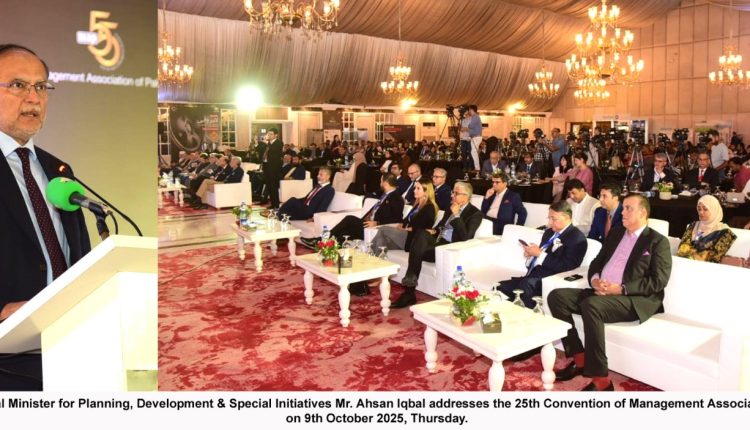Ahsan Iqbal Urges ‘Fourth Uraan’ for Pakistan, Calls Management Excellence Key to National Revival
Pakistan stands at a defining moment in its history and must embark on its “fourth Uraan”
Independent News
KARACHI: Federal Minister for Planning, Development and Special Initiatives Ahsan Iqbal on Wednesday said Pakistan stands at a defining moment in its history and must embark on its “fourth Uraan”; a renewed national economic transformation plan driven by vision, discipline and unity of purpose.
Speaking at the 25th Convention of the Management Association of Pakistan (MAP), the minister said real power does not stem from wealth or weapons but from vision, organization and disciplined execution. “Pakistan today stands at an inflection point. We can either make our rise permanent or risk another fall, as we have seen three times before. But this time, it is not a choice, we have to rise with full force, purpose and unity,” he told the gathering of business leaders and professionals.
Reflecting on Pakistan’s trajectory since independence, Ahsan Iqbal described the country’s four national “Uraans” or take-offs. The first, he said, came soon after 1947 when Pakistan, despite scarce resources, emerged as one of Asia’s fastest growing economies. The second took place in the early 1990s under Prime Minister Nawaz Sharif’s government, when economic liberalization and deregulation opened new doors for private enterprise. The third occurred between 2013 and 2018, when the country overcame crippling power shortages and restored investor confidence through the launch of the China-Pakistan Economic Corridor (CPEC).
“Now we stand at the threshold of our fourth Uraan, the defining opportunity to make Pakistan a competitive, connected and confident nation,” he said.
Drawing parallels with the country’s nuclear achievement, the minister unveiled what he called the “Atomic Model of Success”; a management philosophy rooted in the factors that enabled Pakistan to achieve its nuclear capability despite international sanctions and resource constraints. He said the model rests on shared vision and purpose, stable leadership, meritocracy, investment in human capital, adequate resources and functional autonomy.
“If we apply this atomic model to our economy, governance and public institutions, Pakistan can achieve another national miracle. This time in economic strength, not just defense capability,” he asserted.
The planning minister lamented that Pakistan’s problem was not lack of talent or resources but lack of management excellence and continuity of policy. “Pakistan is not an underdeveloped economy; it is an under-managed economy,” he remarked. Adding that management capital, the ability to plan, execute and deliver holds the key to national progress.
He urged the country’s professionals to become “nation builders”, stressing that leadership requires stepping out of comfort zones, challenging inertia and setting higher standards. “Great nations are not built by financial capital but by management capital,” he said. “Efficiency must replace excuses, data must replace opinions, and teamwork must replace turf wars.”
Ahsan Iqbal also highlighted signs of economic recovery, noting that inflation was easing, the rupee had stabilized and investor confidence was returning. He said Pakistan’s diplomatic outreach had entered a “new era of partnerships”, citing the Pakistan-Saudi strategic framework, the launch of CPEC Phase II, and expanding cooperation with the United States, European Union, Gulf states and ASEAN countries. “These are not isolated gains, they are the foundation stones of Pakistan’s fourth Uraan,” he said.
The minister said the government has operationalized “Uraan Pakistan” of “Uraan Pakistan”, a National Economic Revival Framework built around five pillars; Exports, E-Pakistan (digital transformation), Environment and climate change, Energy and Infrastructure, and Equity and Empowerment. He said the framework would serve as a roadmap to Pakistan’s centenary in 2047, envisioning a strong, smart and self-reliant nation.
Concluding his address, he invoked the guiding principles of Quaid-e-Azam Muhammad Ali Jinnah; Faith, Unity, and Discipline. “Unity gives us strength, faith gives us hope and discipline gives us excellence,” he said. “If we live by these principles, our fourth Uraan will not only lift our economy but also our pride, our spirit and our destiny.”

